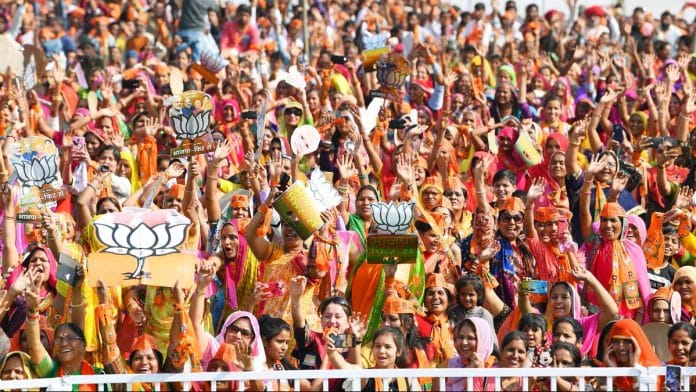Seen as an attempt to consolidate upper caste votes, experts call the reservation move an over-ambitious project to embark on just before the elections.
New Delhi: Months ahead of the Lok Sabha elections, the Narendra Modi government has decided to give 10 per cent reservation to those belonging to the economically weaker sections (EWS) of the general category.
The move is being touted as the government’s attempt to consolidate upper caste votes, but experts say that it’s an over-ambitious project to embark on just before elections, which may not yield the desired political results for the ruling Bharatiya Janata Party (BJP).
“It is clearly an attempt to meddle with the Indian Constitution for political gains… The government is anyway full of Savarnas, how many more do they want?” said Dalit rights activist Ashok Bharti, known to be behind the Bharat Bandh organised by Dalit groups on 2 April last year.
However, Bharti believes that the move will not disadvantage the Scheduled Castes (SC), Scheduled Tribes (ST) and Other Backward Castes (OBC) communities, which already have reservation on government jobs.
“We won’t be disadvantaged because the government cannot fiddle with our existing reservation, but this will make Savarnas fight among themselves for reservation… They have created a rift between the rich and the poor Savarnas now,” Bharti said.
Reports say the quota will be over and above the existing 50 per cent reservation, and thus, won’t impact the fate of the reserved communities.
Also read: Five reasons why the BJP’s upper-caste quota gambit could backfire
‘Beginning of economic status-based quota’
Hiralal Trivedi, a retired Indian Administrative Service (IAS) officer and the patron of Samanya Pichhra Alpsankhyak Kalyan Samaj Sanstha (SAPAKS), an upper-caste, anti-reservation group in Madhya Pradesh, however, said the reservation has to be within the 50 per cent quota set by the Supreme Court.
“The government cannot give quota in the unreserved seats since that would be against Supreme Court guidelines,” he said. “They have to do what they do within this limit.”
A 50 per cent cap on reservation was set up in the 1992 ‘Indra Sawhney Etc. Etc vs Union Of India And Others’ judgment of the Supreme Court.
However, according to reports, the government is set to amend the Constitution to provide for 10 per cent reservation for “economically backward” upper castes to ensure its move faces no legal hurdles.
Trivedi, who had spearheaded large-scale upper caste protests in Madhya Pradesh just before assembly elections, added, though, that this is the beginning of reservations based on economic status.
“We have always opposed caste-based reservation, so in that sense this move has to be celebrated because it is the beginning of reservation based on economic status in India,” he said.
Reports say the government will define the EWS category as families with income below Rs 8 lakh per annum.
Also read: Cabinet approves 10% quota in education, jobs for economically weaker in general category
‘A Herculean task’
A Dalit IAS officer, who wished to remain anonymous, said it will be very difficult to identify the beneficiaries.
“The reason why the concept of creamy layer has always been difficult to implement is that it is very difficult to identify genuine beneficiaries… I can give it in writing that those with incomes less than Rs 8 lakh will not benefit from this move,” the officer said.
It is a move that will eventually come to hit the ‘general’ category, he said.
“The government, on one hand is reducing government jobs — giving out contracts to private groups — so what is the point of increasing reservation?” he said. “The size of the cake is the same, so how much will you distribute?”
“Sub-categorising the general category will be very difficult,” he added.
About a year ago, the government had formed a five-member commission to examine the sub-categorisation within the OBCs. The commission was mandated to work out the mechanism, criteria, norms and parameters for sub-categorisation within OBCs.
Almost a year and a half after its formation, the commission is yet to submit its report to the Centre despite being given five extensions.
Recently, the five-member commission asked for funds from the Centre to conduct a nationwide survey to have an estimate of the caste-wise population figures.







I can’t really see how many will actually benefit in reality. The bulk government jobs, for instance the recent BBC report on 20 million Indians applying for 100,000 railway jobs, don’t have applicants from family with income greater than 8 lakhs. Similar will be case of other bulk government jobs with exceptions like upsc civil services job.(Which are around 800, so will help around 80 candidates from economically weaker sections.)
10% reservation for such widely defined EWS is akin to grace marks to all, which helps no one in zero-sum game of competition for government jobs.
Der lagi aane mein tumko … Pramod Mahajan used to say, In power, time flies; in opposition, it drags on. Five years ago, the tanks were brimful of political capital. Sensible priorities ought to have been set, saplings that could have borne fruit in five years planted. No need for these last minute initiatives.